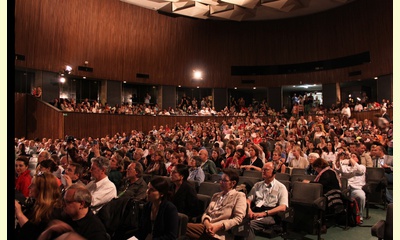|
|
Sarajevo Peace Event: We have to become more visible on the streets
un article par Reiner Braun, IALANA, Lucas Wirl, INES, Kristine Karch, "No to war - no to NATO"
We have to counter the threat of war in the world more intensely
and commonly and we have to interfere in the mankind question
about “war and peace” with much more energy and more
international actions. This was the single vote of all participants of
the largest Peace Event in 2014, which took place on Pentecost with
more than 190 workshops and many cultural events as well as a
large youth camp in Sarajevo. 
photo by Lucas Wirl
click on photo to enlarge
This Peace Event broke some taboos. A major taboo issue was the
fact, that for the first time in 20 years a conference as a central part
of the Event was discussing on the abolition of Nato. The vast
majority of the population and the entire political class of the
country supports BiH membership; at the congress Nato was
subjected to fundamental criticism by international speakers
including Nobel Peace Prize laureate Mairead Maguire, the program
director of American Friends Service Committee Joseph Gerson and
the chairman of the Campaign for Nuclear Disarmament David
Webb and Nato’s abolition was demanded. Another taboo issue,
that has always been controversial, but also discussed with the aim
of the shift towards a social and democratic union, was the role and
importance of the European Union. Its further militarization was
unanimously rejected.
“Peace is possible” – this was the common mood at the opening
ceremony of the International Peace Event on Friday, June 6, 2014 in
Sarajevo. We want "no more war and conflicts have to be resolved
peacefully" - was the message of more than 900 people and peace
activists from 32 countries at the opening ceremony.
he event attended by well-known international and national guests
coined the common concern for peace in the face of increasing
international confrontations, but also the certainty - as a lesson
learned from history - peaceful solutions to conflicts are possible
and the only way to avoid war. This must be desired politically and
enforced by the people who yearn for peace worldwide.
The peace messages of Nobel Peace Prize laureate Mairead Maguire,
Noam Chomsky, Hildegard Goss-Mayr, Verdiana Grossi, Chico
Whitaker, Jasmila Zbanic with their deep contentual impact,
emotional charge and unique expressiveness, associated
themselves in the program with the expressive peace messages of
many Bosnian pupils and students, striving together for peace and
actively advocating for it. The traditional singing of the Sarajevo-
choir "Pontamina" and the lively rhythms of young musicians from
the group "Balsica" full of vitality and positive energy delighted the
national and international audience.
"We need to accept and celebrate diversity and otherness" were the
words of Mairead Maguire, who also appealed to all participants of
the Peace Event: "Let the Sarajevo, where peace ended, be the
starting point for the bold beginning of a universal call for peace
through the wholesale abolition of militarism." Again and again the
importance of the UNESCO culture of peace program as an
alternative program to war and militarization was emphasized. Or
as Ingeborg Breines from the International Peace Bureau (IPB) put it:
"without non-violent actions it will just not work."
(This article is continued in the discussionboard)
|








|
DISCUSSION
Il n'y pas encore de question liée à cet article.
* * * * *
Commentaire le plus récent:
(The following is continued from the main article listed above.)
All discussions were held in the atmosphere of great solidarity, mutual respect, understanding and learning from each other. Peaceful coexistence was lived and celebrated on the large cultural event. Militarism alternatives have been intensively worked on. The discussion encompassed an impressive range of different topics: from the system question, non-violent actions, actions of civil courage to civil conflict resolution, prevention, disarmament and common security in the common house of Europe. These considerations were rarely confronted with each other and a more holistic approach is predominating. There is certainly no lack of anti-militarist proposals and considerations - but they must be politically intended and enforced against a policy that wages war for geo-strategic interests.
Of particular importance was also the solidarity concert for the flood victims in the region, in which several groups from Bosnia and Herzegovina, but also Manfred Maurenbrecher from Germany participated. Impressive was also the open air concert in memory of Pete Seeger, which took place on Sunday evening.
Many considerations for joint operations, including joint actions in 2015 (70 years after the end of World War II), a next international women's conference, cross-border operations against the “fortress of Europe”, actions for peace in Syria, protests against the threat of war in Europe, an international campaign for the reduction of military spending were discussed at the Peace Assembly on Monday.
Much still needs to be reviewed and delivered. . ... continuation.

|
|









